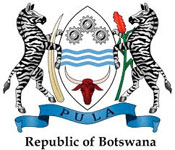If Ian Khama has any say in the matter‚ and he most certainly shall‚ Chinese companies may not be collecting many more government contracts in Botswana in the near future.
Since he is the president of the thinly-populated and resource-rich country and since the party he leads is dominant in parliament‚ the prospects for Chinese bidders for infrastructure tenders are not looking great.
"You know‚ we have had some bad experiences with Chinese companies in this country‚" Khama said in a recent interview.
"The best way I can put it is that we are very‚ very particular now‚ we are going to be looking very carefully at any company that originates from China in providing construction services of any nature‚" he told Business Day in Gaborone.
Power generation is the key sector where China is not favoured inside the Office of the President. Frequent cuts in Botswana's power supply are affecting everyone‚ from business and retail to ordinary people.
The disruption is not what Batswana have known during the past decades of rapid growth‚ built on diamonds‚ agriculture and tourism. Power shortages will not attract the large investment in railways‚ roads and mining that are planned.
Khama laid the blame for the country's chronic shortage of power at one door.
"Right now‚ as we speak today‚ we should be totally self-sufficient if we hadn't been let down by the Chinese.
"Those generation plants at Morupule B should have all been up and running by the end of last year - but only one of the four is operating‚" he said.
"We have started really tightening up on the way Chinese companies deliver on government contracts," he said.
Huge growth
The Chinese embassy in Gaborone did not respond to a request for reaction to Khama's views. But relations were excellent as recently as 2009‚ a year after he became president‚ when Chinese companies were running 18 construction projects in Botswana‚ building stadiums‚ schools‚ hospitals‚ airports and public buildings.
In the same year‚ agreements were signed for the US$1.6bn expansion of Morupule B‚ financed by the Botswana government‚ and involving the installation of four 150 megawatt coal-fired units.
On the basis that everything would be up-and-running on schedule in 2012‚ Khama said‚ Botswana did not negotiate extra supply from SA's Eskom.
"Now we have had to go on our knees‚ begging Eskom to continue supplying us even though they have their own challenges in SA.
"They have been very generous and understanding but they cannot guarantee an uninterrupted supply‚" he said‚ adding that he expected the months-long shortage to be over in a few weeks.
Yet the power issue clearly rankles‚ perhaps because it does not project the image - forged by Khama's late father‚ Sir Seretse Khama - of a quietly efficient African country where almost everything works.
Judging by Khama's comments‚ it will be a big ask for a Chinese company to get a slice of lucrative future rail projects. Some of Botswana's enormous untapped coal deposits are destined to be carried on new railways linking to ports in Namibia and Mozambique.
Khama said that if the rail projects are to be financed by private companies‚ the government will have no say in the choice of sub-contractors.
"But certainly if government has anything do with it we would be urging caution to those private companies to ensure that they don't have the scenario that we have experienced here. Companies from there (China) put up a structure and after some time you find it falling apart and needing a lot of maintenance before maintenance should be due‚" he said.
"The worksmanship is not the best," he added.
Khama's views can be heard across Africa but he is definitely not with the official programme‚ the one endorsed by a majority of African leaders and enthusiastically by the SA government. Bilateral trade between Africa and China has risen swiftly‚ reaching US$166bn in 2012‚ according to official data in Beijing last week.
Is Khama in a minority when China is discussed by African presidents?
"They probably won't say it publicly but when I've spoken to others they've expressed frustrations as well.
"People feel that China is now the second biggest economy in the world. You say things like that‚ do you really want to upset such a huge power?
"But there's no point having a huge power investing in a country if those investments don't do you any good," he said.
He complained about what he considers excessive migration of Chinese to take jobs that should be done by Batswana. He has asked the immigration department to get him accurate statistics on the subject.
"We accept China's goods. But they don't have to export their population to sell us those goods. That we can quite ably do. They will crowd us out," he added.
Source: Business Day via I-Net Bridge








































